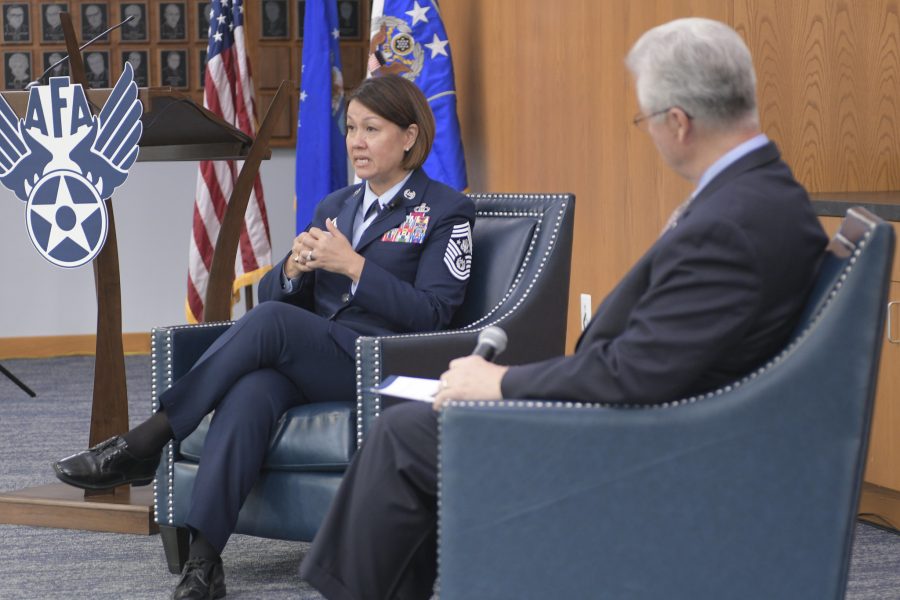Despite its diversity, the U.S. Air Force has an inclusion problem, Chief Master Sergeant of the Air Force JoAnne S. Bass said Sept. 16.
“Diversity [means] you ask somebody to the dance. Inclusion is you actually ask them to dance,” she explained in a post-keynote Q&A at AFA’s virtual Air, Space & Cyber Conference. “We need to have people who are actually asking people to dance and be part of that culture, that organization, that mission, and that sense of belonging.”
During a panel on diversity and racial challenges within the Air Force held the same day, Bass said the inherent power of an organization’s diversity is the versatility with which its members’ differences imbue the whole.
“It’s critical to have that diversity in the Air Force that we have today because it is truly through that diversity that we can become the greatest organization and continue in that legacy, because it will make us more creative, more open, more innovative, you know, better at problem solving when you have the differences of perspective that our unique Airmen bring to the fight,” she said.
But in the context of defense, if people look at diversity in a vacuum—minus inclusion—they’re missing the whole point, since the goal isn’t tokenism, said fellow panelist, former Air Force Vice Chief of Staff, and former AFA president retired USAF Gen. Larry O. Spencer.
“Not only do you want to reflect the population that you serve, but you also want to throw a problem in the middle of the table and have all kinds of ideas come into it,” he said. “That way, the decision-maker can get maybe ideas that he or she never would’ve thought about.”
Air Force and Pentagon diversity efforts should shoot to achieve “combat capability” and “lethality,” he said—not recreate Noah’s Ark.
“It’s not about, you know, getting one of these or two of those,” Spencer said. “It’s about making the organization stronger and better. And I think once people understand that, it becomes a different conversation.”
The Way Forward
Admitting that a problem exists is the first step toward solving it, Air Force Chief of Staff Gen. Charles Q. Brown Jr. said during a Sept. 14 vASC Q&A.
“You know, it may have been … not talked about as much, but because of the death of George Floyd and the other aspects across our nation, it’s driving a conversation,” Brown said. “So our Airmen feel much more comfortable talking about it.”
But USAF must walk the walk and talk the talk if it wants to cultivate a more inclusive culture, he said.
Brown said the service has taken some first steps, but the path to great inclusion won’t be instantaneous.
“This is a long-term journey, and we didn’t get here overnight,” he said. “We’re not gonna change overnight.”
Overhauling USAF’s culture will require an examination of recent and ongoing Air Force efforts to create a healthier service environment, as well as a long-term pursuit of best practices that eventually make inclusion a second nature for the Air Force that permeates its approach to equity and representation across the Total Force, Brown said.
During her post-keynote Q&A, Bass said she’s waiting on the results of a diversity- and inclusion-related survey that was open to Total Force Airmen and space professionals as part of the Air Force Inspector General’s deep dive into racial disparities within the Department of the Air Force before coming up with a formal game plan for enhancing USAF inclusion.
The results, which she said she’s yet to see since they’re still being compiled, will be shared with the public in coming weeks, she said.
“Once we have that, we have got to determine what are the lines of effort that we can do with it as an Air Force from, you know, the headquarters staff to each major command to each wing to each leader?” she continued. “What are those lines of effort that we can do to get after that stuff? What’s actionable? And then we will determine … here’s how we measure those things if we do that.”
Also on Sept. 16, Air Force Deputy Chief of Staff for Manpower, Readiness, and Services Brian T. Kelly announced that the service’s Diversity and Inclusion Task Force will turn into an Office of Diversity, Inclusion, and Belonging that will work for Air Force Secretary Barbara M. Barrett and support Brown and Chief of Space Operations Gen. John W. “Jay” Raymond in their efforts on these fronts.
